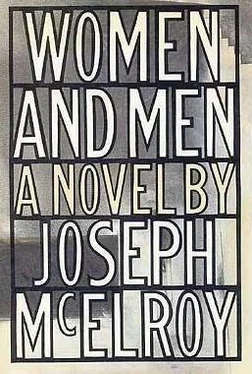Later he said, "Call your mother." He had hard, dry crumbs all over his place.
Flick didn’t answer for a moment. "One side of my head says O.K.; the other side says Oh shit why should I?"
She seemed not to know what was obviously in his head.
Andrew, Andrew.
Jim visited him occasionally totally unexpectedly, but more often he kind of worried about it and thought he must make a point of flying to Boston or having Andrew to New York or Washington, the maker of riddles. All but one of which riddles came out as clear and economical as a good lead: the one in question, however, sweaty and long-winded like the sweaty expensive late-night grass it came from, and assembled mostly from what the father over years had said to one or another about himself: Somewhere two people are turned into one; yet witness another One, lone species offspring from these preceding two; and as he, this One, looks back to them, who were not much together and preceded each other when departing, he can’t see quite where they went; and, deserted by that origin, this One feels thrust from that loss into the future, where he should be glad to be because, newsman as he becomes, it’s where tomorrow’s news is; but he isn’t glad, because bringing some bits of that aborted origin always along with him jetsam of a mystery far more intelligent than he which is partly the Shock of his unhappy mother once upon a time disappearing into the elements, he has on just one side of his mind the lone One of himself evolved adrift from that lost origin as if to find it in the future where he travels—
(whew! a lighter voice exhales returning or retelling the riddle to its subject on another late night).
Not the night here, though, toward the end of which, after a Greek dinner with his daughter, Jim called Joy when he was alone, feeling steady then, but not very solid.
Hello, he heard her say, softly so he felt no one had been thinking about him just before he’d called — which was kind of maudlin, which in turn might be the tariff on what was possibly just plain true. But her second hello wasn’t your enthusiastic Hello! but the same quiet, thought-like word, so he felt that she had been thinking about him, or she’d been thinking about her relation with Jack.
So here Joy was and was willing to talk but she made him feel it had to be about something. Then clearly she thought maybe he’d had more than enough. Her voice hit him and he got a still breath of the New Hampshire night from behind his eyes.
He thought he would (he said) drop in on her and Jack.
Has Andrew written you lately? she asked.
She didn’t quite say not to come, but she didn’t want him.
Which let him feel he didn’t know what she wanted. Which was, he knew, what she wanted — mutual debt minus time.
He expected to be in Montpelier and he could get a plane from there to Keene, he thought, and he wondered if she was looking at Jack while she talked. What the hell is it that happens anyway, he thought, you get a divorce from somebody you love because there’s too much between you, too much nerves, too many wrong pauses; and you go from there into a lesser relationship, isn’t that what happens? — and were these some words coming from his daughter’s private thoughts at dinner? — or somewhere else? — or from him alone? He didn’t mention dinner with their daughter Flick or the book that Joy and Jack had sent her for her birthday, The Letters ofF. Scott Fitzgerald; didn’t mention a disturbing and involved and unanswered letter from Andrew many weeks ago, but like a blank Mayn saw the dark back of Jack’s head bending toward the different-shaped stones framing a hearth that had seldom been used in summer. He said he didn’t know how much time he’d have after Montpelier, and Joy didn’t ask him what he’d be doing in Montpelier. He said it was about an insurance investment in South America, he had to ask a few questions without telegraphing his moves by making an advance appointment, though a lobbyist who was trying to get a rider onto a bill that was still in committee and who was pretty good himself at being in two or three places at once might have told the man in Montpelier that Mayn was quite capable of materializing.
No one was running for cover exactly, but — and he asked if she recalled — and she interrupted him with "the letter I wrote — why wouldn’t I recall it?" The "wouldn’t" stopped the flow, if there’d been any, but he was dazzled and his heart was on the move, he bet she heard it. But she was demanding that he not stop, he felt that. And so he told her O.K. if she came on like that O.K. then, he was answering the letter now ten years late in which she’d said "cover story."
"But it was answered," she said. "By phone, by letter, and" — he knew she’d dropped her eyes—"by nothing."
"But I wasn’t always away, and I wasn’t away that much, was I?"
Meanwhile she was saying under him and over him, We had all that out — Christ how he got into her mind and she couldn’t think straight, they were into each other for more than either could afford, or at least afford to think about. No, he said, she’d said his being away too much was their cover story. Corny, said Joy, but we all get that way. She was quite fond of the old apartment — aesthetic distance, she said (and he saw the night shadows of maple branches and couldn’t make out if the spruce and pine were pale with snow). Please, he said — and felt he was inciting her to hang up — and said then not what was in his mind but something truly trite, which went something like What world are we living in where it’s wrong to need the warmth and familiarity of another person, your spouse — bad word — your man, your woman — too possessive — let me finish—
Oh for God’s sake, she said (and didn’t say what he felt he distinctly picked up and without a "dear Jim") "You’re in your cups" — oh the unfairness of that! — he knew he’d phone and tell Flick, who would sound interrupted, whatever she was doing, except she’d pay close if tired attention and even get a little laugh out of it. He let his hair down more than ten years ago, he reported probably quite exactly what Joy had said: "What’s between us is what we were and you’re not going to fix that. Men and women often don’t get along. I hated it when you were away. I knew I would. I kept track of what time you arrived places, sometimes it made me feel more like an old person than a sailor’s wife. Then you came back. Then you went away to Bridgeport, Cape May, Boston, Florida. You came back. You went away, and a box of grapefruit arrived from the Coast Guard. You came back from Portland with four serrated spoons and ate some of the grapefruit. Suddenly you didn’t go away — it often felt like that — there you were, pinning up Flick’s hair while the tub ran and the faucets and pipes were groaning and you were still getting the last hairpin in and she was stepping into the tub and you thought she’d fall; I was thinking whether to pick Andrew up or let him yell and you got the pin to hold and your hand touched that little shoulder and I had to admit that, well, my husband touched me too like that, but damn it all (yet it’s a family, it’s a family!) yet I thought damn nice of him to borrow us — to^Hit in an appearance and put up that little girl’s hair for her bath with my hairpins, two years old, three years old, four years old, she didn’t get private about herself with you till way past what the book said but she did with a babysitter (that Irish girl from just the other side of Third who lived in the tenement brownstone they tore down to put up the apartment high-rise everyone kept saying wrongly for months was a Howard Johnson motor inn, who would tell you when you walked her home that the priest had been getting her alone a lot), with that Irish girl in the room Flick wouldn’t get undressed at the age of seven. But I was used to you being away. It affected my thinking. What thinking? I did a lot, I thought, but now I don’t think it even was thinking, it was like years of our both play-acting that we didn’t claim (you know) power over each other. So there you were. I thought I shouldn’t turn the TV on; you were home. I had suddenly to be contented. I was crazy. You didn’t talk about big events, and I thought I was glad you didn’t, and you think history’s a mess anyway. So I turned on the TV anyway. There it was, Judgment at Nuremberg you’d thought you’d missed. Playhouse 90. Good. You were glad it was on. You went away and it was like coming into range. But I must have had that range; listen, when I married you I thought I knew all about your being away and then home, and you would be—
Читать дальше












